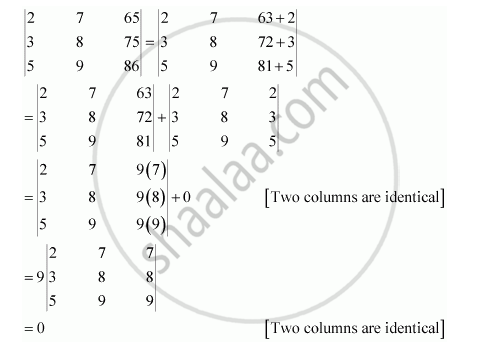Advertisements
Advertisements
प्रश्न
Using the property of determinants and without expanding, prove that:
`|(2,7,65),(3,8,75),(5,9,86)| = 0`
उत्तर

APPEARS IN
संबंधित प्रश्न
Using properties of determinants prove the following: `|[1,x,x^2],[x^2,1,x],[x,x^2,1]|=(1-x^3)^2`
Using properties of determinants, prove that
`|((x+y)^2,zx,zy),(zx,(z+y)^2,xy),(zy,xy,(z+x)^2)|=2xyz(x+y+z)^3`
Using the property of determinants and without expanding, prove that:
`|(a-b,b-c,c-a),(b-c,c-a,a-b),(a-a,a-b,b-c)| = 0`
Using the property of determinants and without expanding, prove that:
`|(1, bc, a(b+c)),(1, ca, b(c+a)),(1, ab, c(a+b))| = 0`
By using properties of determinants, show that:
`|(a^2+1, ab, ac),(ab, b^2+1, bc),(ca, cb, c^2+1)| = 1+a^2+b^2+c^2`
Using properties of determinants, prove that:
`|(alpha, alpha^2,beta+gamma),(beta, beta^2, gamma+alpha),(gamma, gamma^2, alpha+beta)|` = (β – γ) (γ – α) (α – β) (α + β + γ)
Using properties of determinants, prove that:
`|(x, x^2, 1+px^3),(y, y^2, 1+py^3),(z, z^2, 1+pz^2)|` = (1 + pxyz) (x – y) (y – z) (z – x), where p is any scalar.
Using properties of determinants, prove that `|(x,x+y,x+2y),(x+2y, x,x+y),(x+y, x+2y, x)| = 9y^2(x + y)`
Using properties of determinants show that
`[[1,1,1+x],[1,1+y,1],[1+z,1,1]] = xyz+ yz +zx+xy.`
Using properties of determinants, prove that
`|[b+c , a ,a ] ,[ b , a+c, b ] ,[c , c, a+b ]|` = 4abc
Using properties of determinants, prove that:
`|[a^2 + 1, ab, ac], [ba, b^2 + 1, bc ], [ca, cb, c^2+1]| = a^2 + b^2 + c^2 + 1`
Using properties of determinants, prove the following:
`|(a, b,c),(a-b, b-c, c-a),(b+c, c+a, a+b)| = a^3 + b^3 + c^3 - 3abc`.
Without expanding evaluate the following determinant:
`|(1, "a", "b" + "c"),(1, "b", "c" + "a"),(1, "c", "a" + "b")|`
Using properties of determinants, show that `|("a" + "b", "a", "b"),("a", "a" + "c", "c"),("b", "c", "b" + "c")|` = 4abc.
Solve the following equation: `|(x + 2, x + 6, x - 1),(x + 6, x - 1,x + 2),(x - 1, x + 2, x + 6)|` = 0
Without expanding determinants, show that
`|(1, 3, 6),(6, 1, 4),(3, 7, 12)| + |(2, 3, 3),(2, 1, 2),(1, 7, 6)| = 10|(1, 2, 1),(3, 1, 7),(3, 2, 6)|`
Without expanding determinants, find the value of `|(2014, 2017, 1),(2020, 2023, 1),(2023, 2026, 1)|`
Find the value (s) of x, if `|(1, 4, 20),(1, -2, -5),(1, 2x, 5x^2)|` = 0
Without expanding the determinants, show that `|("b" + "c", "bc", "b"^2"c"^2),("c" + "a", "ca", "c"^2"a"^2),("a" + "b", "ab", "a"^2"b"^2)|` = 0
Using properties of determinant show that
`|("a" + "b", "a", "b"),("a", "a" + "c", "c"),("b", "c", "b" + "c")|` = 4abc
Select the correct option from the given alternatives:
The determinant D = `|("a", "b", "a" + "b"),("b", "c", "b" + "c"),("a" + "b", "b" + "c", 0)|` = 0 if
Select the correct option from the given alternatives:
Let D = `|(sintheta*cosphi, sintheta*sinphi, costheta),(costheta*cosphi, costheta*sinphi, -sintheta),(-sintheta*sinphi, sintheta*cosphi, 0)|` then
Select the correct option from the given alternatives:
The system 3x – y + 4z = 3, x + 2y – 3z = –2 and 6x + 5y + λz = –3 has at least one Solution when
Evaluate: `|("a" - "b" - "c", 2"a", 2"a"),(2"b", "b" - "c" - "a", 2"b"),(2"c", 2"c", "c" - "a" - "b")|`
Prove that: `|("a"^2 + 2"a", 2"a" + 1, 1),(2"a" + 1, "a" + 2, 1),(3, 3, 1)| = ("a" - 1)^3`
If A, B and C are angles of a triangle, then the determinant `|(-1, cos"C", cos"B"),(cos"C", -1, cos"A"),(cos"B", cos"A", -1)|` is equal to ______.
The value of the determinant `|(x , x + y, x + 2y),(x + 2y, x, x + y),(x + y, x + 2y, x)|` is ______.
If cos2θ = 0, then `|(0, costheta, sin theta),(cos theta, sin theta,0),(sin theta, 0, cos theta)|^2` = ______.
`|(x + 1, x + 2, x + "a"),(x + 2, x + 3, x + "b"),(x + 3, x + 4, x + "c")|` = 0, where a, b, c are in A.P.
The determinant `|(sin"A", cos"A", sin"A" + cos"B"),(sin"B", cos"A", sin"B" + cos"B"),(sin"C", cos"A", sin"C" + cos"B")|` is equal to zero.
In a third order matrix B, bij denotes the element in the ith row and jth column. If
bij = 0 for i = j
= 1 for > j
= – 1 for i < j
Then the matrix is
Let a, b, c be such that b(a + c) ≠ 0 if
`|(a, a + 1, a - 1),(-b, b + 1, b - 1),(c, c - 1, c + 1)| + |(a + 1, b + 1, c - 1),(a - 1, b - 1, c + 1),((-1)^(n + 2)a, (-1)^(n + 1)b, (-1)^n c)|` = 0, then the value of n is ______.
If f(α) = `[(cosα, -sinα, 0),(sinα, cosα, 0),(0, 0, 1)]`, prove that f(α) . f(– β) = f(α – β).
The value of the determinant `|(6, 0, -1),(2, 1, 4),(1, 1, 3)|` is ______.
Without expanding evaluate the following determinant.
`|(1, a, a + c),(1, b, c + a),(1, c, a + b)|`
Without expanding determinants find the value of `|(10,57,107),(12,64,124),(15,78,153)|`
By using properties of determinant prove that `|(x+y,y+z,z+x),(z,x,y),(1,1,1)|` = 0.
By using properties of determinant prove that `|(x+y,y+z,z+x),(z,x,y),(1,1,1)|=0`
